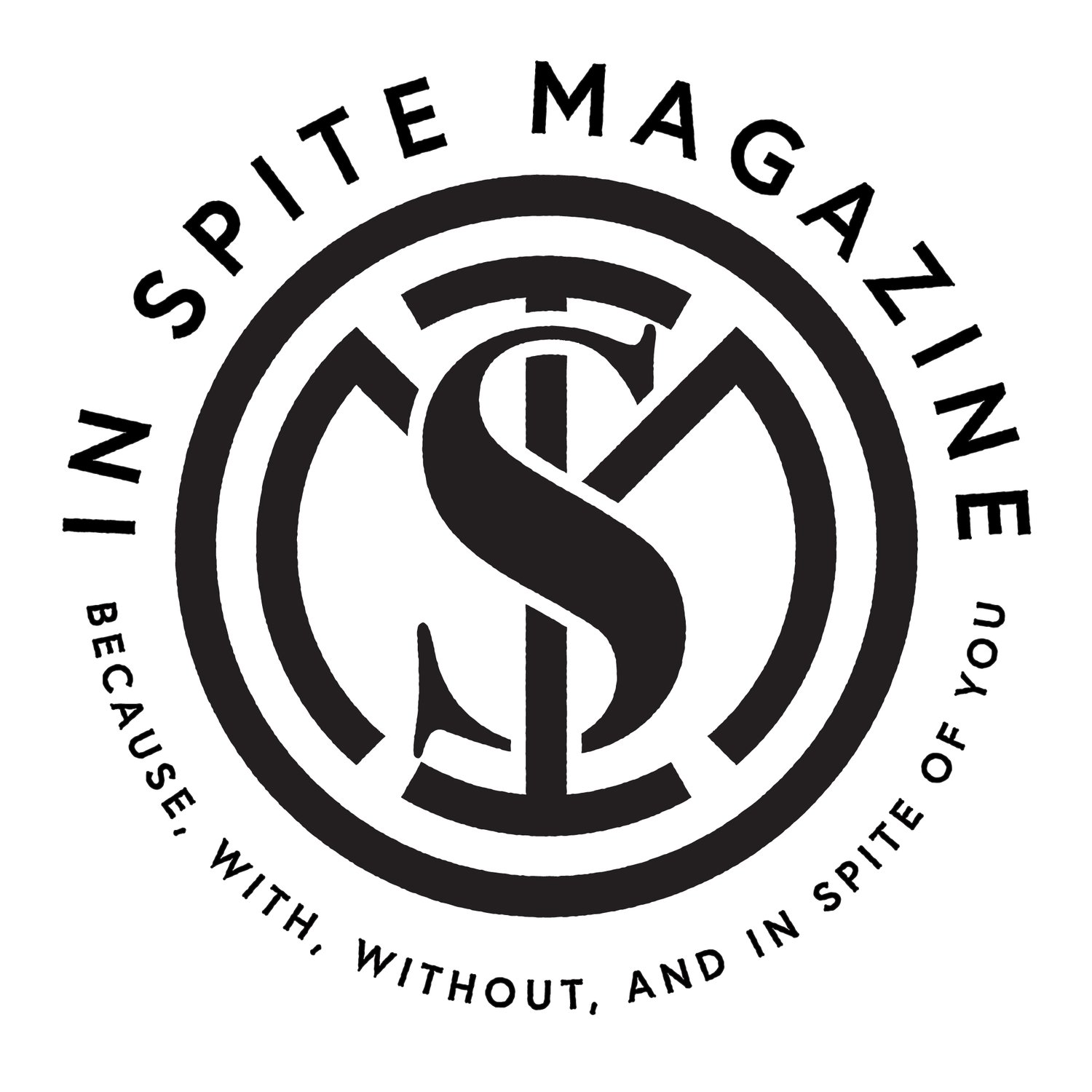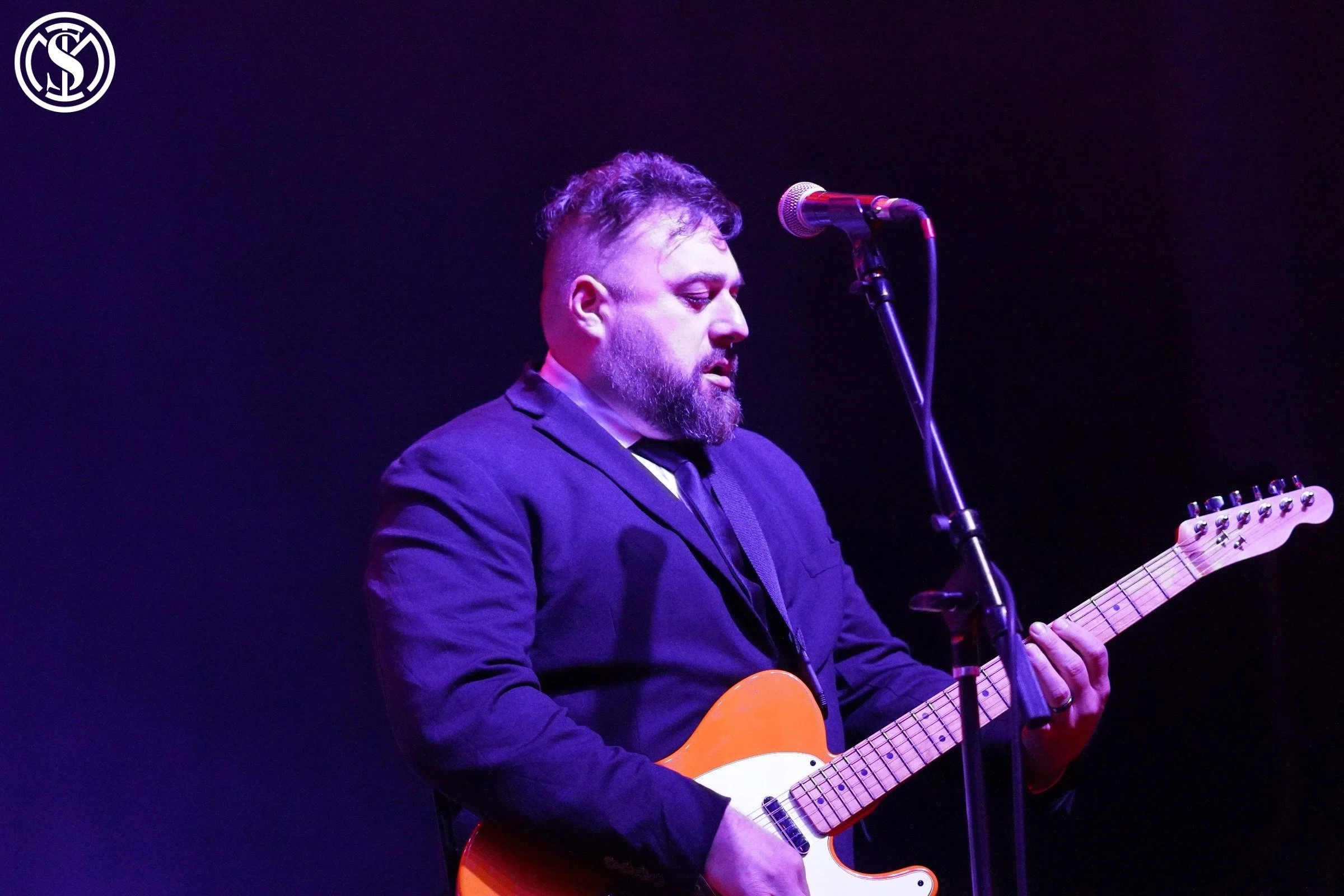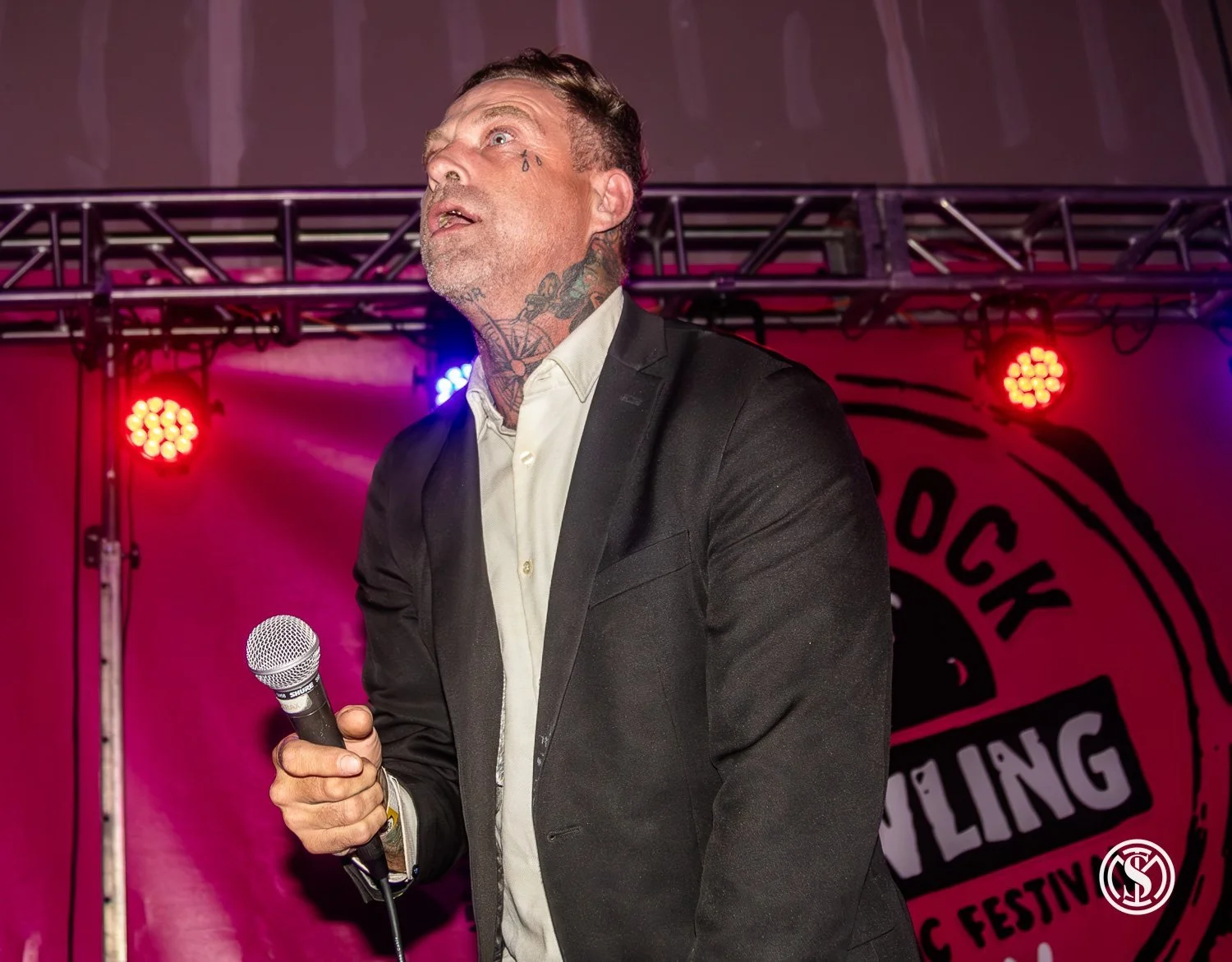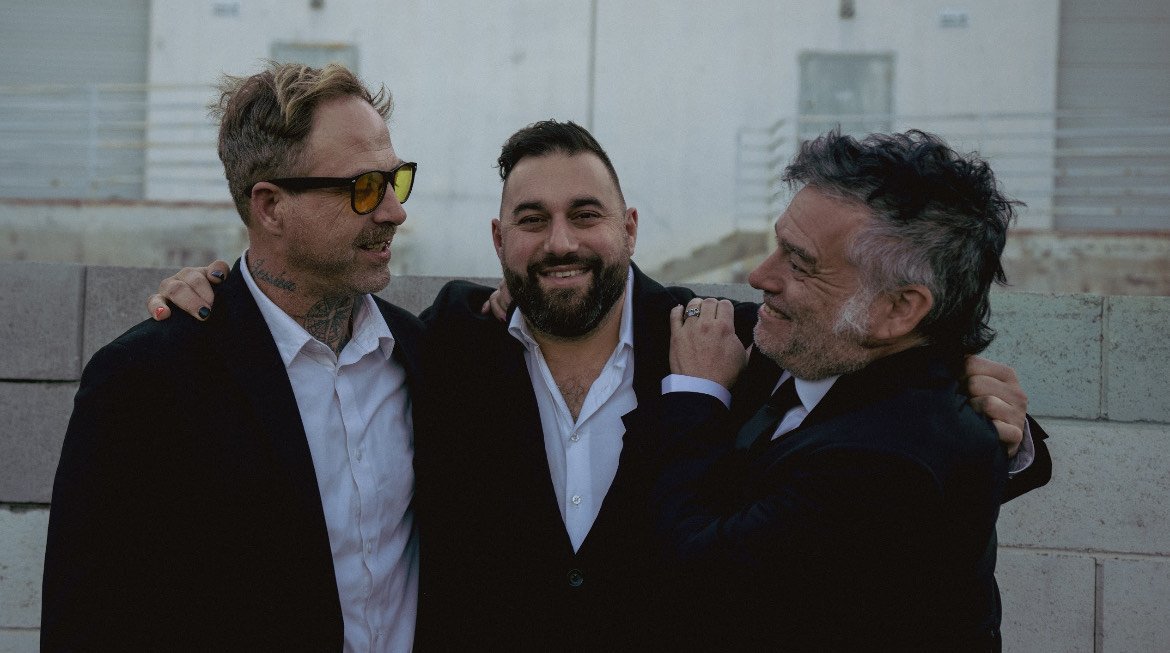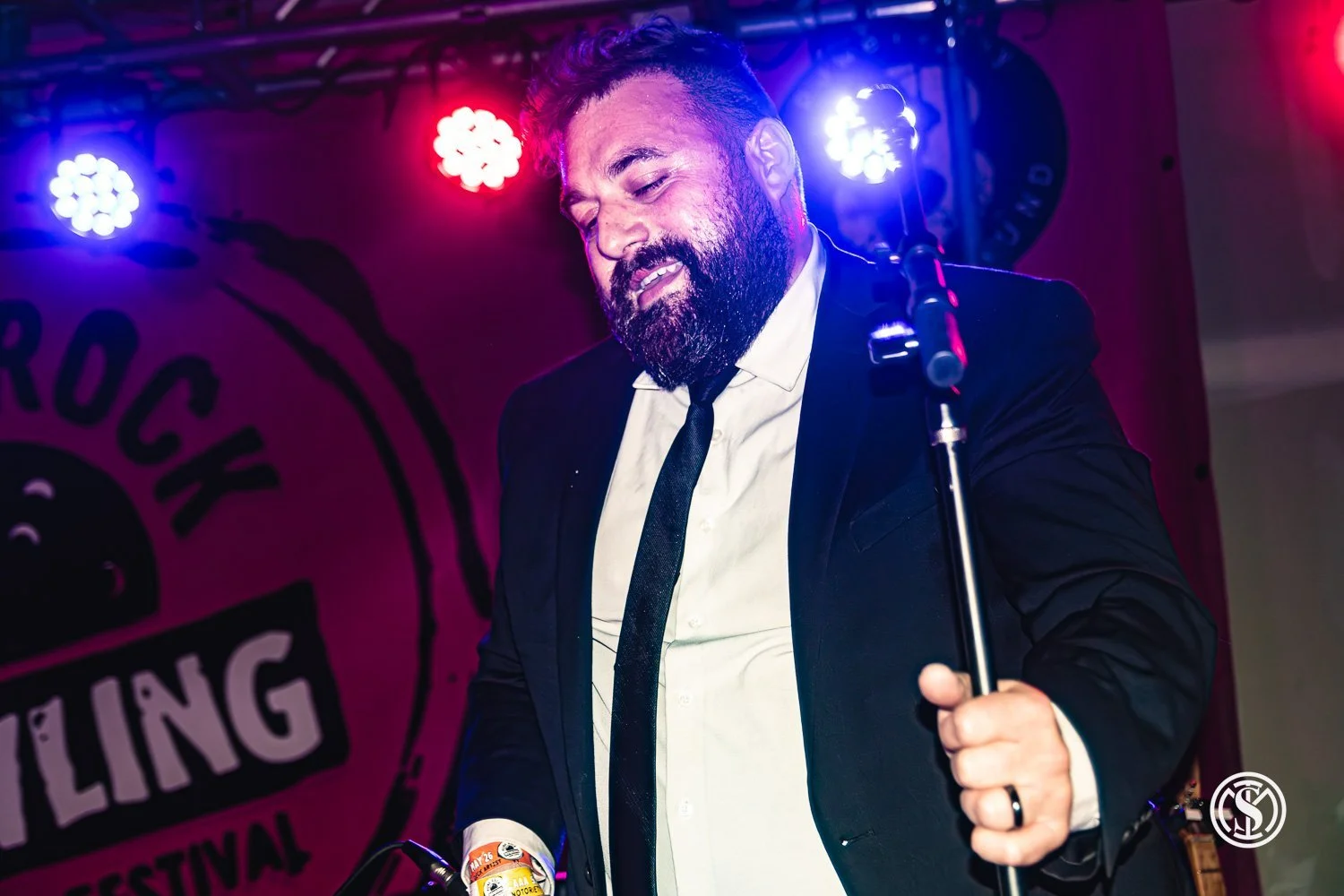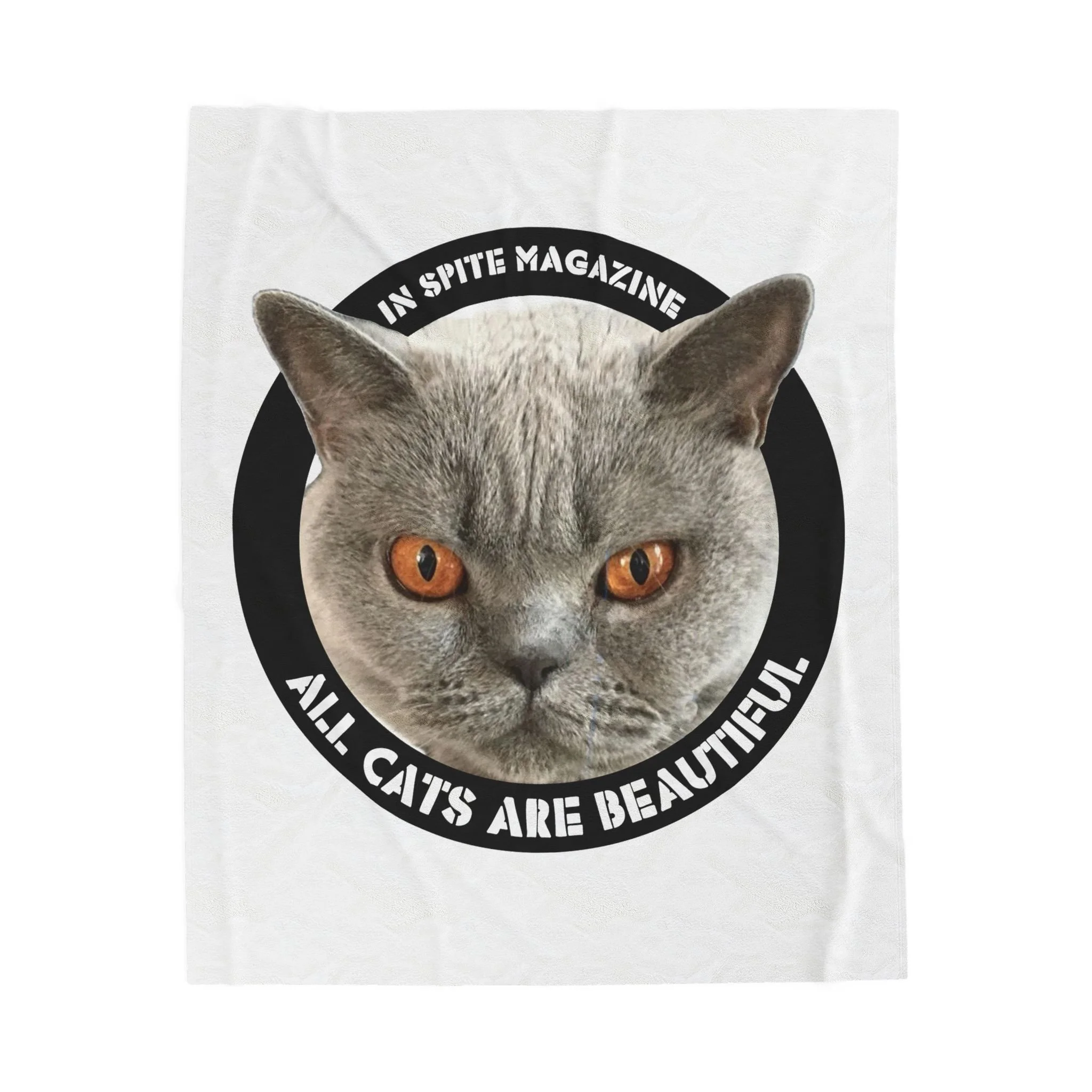Ceschi Ramos On The New Codefendants Music Video, Friends In Real Life, and Anarchism
Photo by Paul Holstein
Depending on what music scene you are a part of, you may know Ceschi Ramos as a rapper, a folk punk troubadour, or both. Over the past two decades, he has released a vast discography and collaborated with everyone from 2Mex to Pat the Bunny. In 2021, Ramos joined up with Sam King from Get Dead and Fat Mike from NOFX to form Codefendants, a group that continues to blur the lines between genres. Earlier this month, Codefendants released a music video for their new single, “Right Wrong Man,” which was directed by the art collective Indecline. They’ll be performing at Punk Rock Bowling this weekend and throwing a single release party at the Punk Rock Museum on May 27. The following is an interview with Ceschi Ramos about the new Codefendants single, his involvement with the new Friends In Real Life album, his musical background, and more.
Goody James: You've always been a master of blending genres. Even looking back at your Fistful of Vinyl live session videos, in a way, those foreshadowed what you’re now doing with Codefendants.
Ceschi Ramos: It's cool that you brought that up. You might be one of the only people to bring that up in the context of Codefendants, but I think that video is the reason Codefendants started. Because Sam (King) showed that to Mike. So by the time I had met Fat Mike, he was like, “I know who you are. It's hip hop, but it's punk!”
Because he doesn't really know shit about hip hop, so that was a way for him to kind of be introduced to hip hop in a way that he could understand, with the whole breakdown in the middle. Sam was showing him, like, Aesop Rock and all these other things, and Mike just didn't get it. He was like, “What the fuck is this?” Because he didn't grasp it. He understood, like, the technicality of the rap, but it didn't have enough musicality for him. But when he saw that Fistful of Vinyl, he got it.
GJ: That blending of genres seems like it comes naturally to you. Is there a genre that was your entry point into going to shows or making your own music?
CR: Hip hop was the first genre I dabbled in as a little kid. I lived in a neighborhood that was predominantly Black, and we rapped because that was just a thing we did. We were just kind of freestyling, and my first raps on tape were recorded in 1989. So we’re talking about an era of Black nationalism and Malcolm X shirts and, you know, like Cross Colours. I used to live about two blocks from the Berkeley Flea Market, and that's where I got my first rap tapes. I heard Public Enemy, “Fear of a Black Planet.” I was into little kid rap, like MC Hammer and the Fat Boys and Heavy D and Fresh Prince, and then I got into the more serious stuff shortly after. But with shows, it was directly because of punk rock. My big cousin had been in punk and thrash metal bands since he was 16, and he's 10 years older than me. He's currently the drummer of Cro-Mags. So I had this lifelong connection to hardcore as well. That was my cousin from New Haven, Connecticut, but my cousins in Puerto Rico were also punks. My cousin, Ernesto, started a band in Puerto Rico called Juventud Crasa, which means Crass Youth in Spanish. They're still around, and he's doing a new project now. So show-wise, I didn't go to hip hop shows, really, until later. It was all-ages punk shows.
GJ: So you’ve always had a foot in both worlds.
CR: Yeah. Like, I had my Gilman Street card when I was 13. When I moved to the East Coast, I moved to New Haven, Connecticut, and I started going to a place called the Tune Inn, which was like a famous all-ages spot that all the hardcore bands from New York would go to constantly. I would see bands like Madball, Vision of Disorder, Earth Crisis, 25 ta Life, Shelter, and stuff like that.
GJ: Are there any of those Gilman Street shows that stick out to you?
CR: You know, I would go just casually. I remember seeing The Groovie Ghoulies and bands like that. That era, Lookout! Records stuff. I didn't really go to any massively big ones, just a lot of local shows. And eventually, I started playing Gilman Street. I mean, the shows that stick out to me are shows I played. Like playing there with Sage Francis was a very special show for me.
Sam King of Codefendants - Photo by Dick Slaughter - ©dickslaughter.com
GJ: Were you aware of Yoni Wolf from Why? or anticon.?
CR: Oh yeah. So I met Yoni when he first moved to the Bay because I was connected to anticon. through Sole and Doseone. I met Yoni when he first moved from Cincinnati to the Bay. In fact, I think we first met right at the Berkeley Flea Market. I should also explain this because of my timeline: my father still lived in Oakland at the time, even though my mother moved to the East Coast. I went to high school on the East Coast, but I was still going every summer back to Berkeley and Oakland. So when I was 18 years old, I met Sole, and that's how I met Yoni Wolf and Why?, who, I think looking back, has been a huge influence on me. We recently talked about non-music stuff. He's a good friend of mine. That's cool. That was a great question to ask.
I feel like musically, aside from hardcore, the Bay Area was, for abstract hip hop, a spot for a long time. I think Quannum came out of there, Hieroglyphics, Living Legends, and eventually Anticon. I was also a member of this collective called L.A. to the Bay, and that's how I was connected with another larger collective called Project Blowed in Los Angeles. So I would say a lot of them would consider me part of the last generation of Blowdians. In fact, my band, Toca, was on the Project Blowed 10-year anniversary compilation. I was in a band with Xololanxinxo from Of Mexican Descent. I used to basically sleep on 2Mex and Xinxo’s couch; all the Freestyle Fellowship were my mentors, and the Shape Shifters. And so if you know about any of that stuff, that's kind of what I come out of in hip hop.
GJ: Tell us about the new Codefendants single, “Right Wrong Man,” and the music video for it.
CR: It's probably one of the only songs that Fat Mike wrote all of the music for. He's done that in the past, like with the song called “Def Cons.” He wrote all the music on that, but this really started as a Fat Mike song that we contributed verses and our vocals to. At first, I didn't really know what to do with it, because he had kind of written the whole thing. Later on, after sitting with it, we went to Portland, Oregon, and I wrote that kind of pre-chorus, the “self-saboteur” thing. It started coming together, gelling together, and it grew on us. Funny enough, it was like a kind of afterthought of a song that really grew on us, and it was the first one we actually finished. So we decided to make this video with Indecline, and it was probably one of my favorite music video experiences. It was so fun.
GJ: What's it like working with Indecline? That's not the first video that they've directed for you guys.
CR: I love working with them. I respect them so much as a collective. I've met dozens of members of Indecline. It's kind of a worldwide thing, but we know who I would call, like the unofficial, maybe official, leaders of the crew. Unfortunately, one of the leaders of the crew was the graffiti artist Aware, who passed away a few years ago. I really had super deep respect for him, and he was a friend of Sam's. We all come from similar circles. In fact, those guys were big Anticon fans and Shape Shifters fans back in the day. So that's that connection. They knew about my music before I met them, and it just makes a lot of sense for us to work with those guys. We have a lot in common, and we're just friends. Hopefully we'll have more to come with them on a bigger scale, as far as public art and stuff like that. That's what we hope to do.
GJ: It seems like a good match. Not just artistically, but in an ethical and political sense as well.
CR: Yeah, I think I see eye-to-eye with some of the members of Indecline. Our politics are very similar. I consider myself a communalist anarchist. Out of all the politics I've studied over many years, that's sort of the direction I’ve gone. So I'm kind of like a Bookchin anarchist, if you know who Murray Bookchin was. Some of the members of Indecline, I think, would consider themselves that as well. I can't speak for everybody, and I think that's some of the beauty of anarchy. That it is a malleable kind of philosophy that's about constantly questioning yourself and accepting change. I grew up way more interested in communism and international associative socialism, and I’m still politically driven by Marx in a lot of ways. But what I like about anarchism is that it's a malleable thing. It's not this hard-line system. It's about moving and shifting with the constantly moving, shifting culture and capitalism, which is a constantly moving and shifting animal. So I think that's where some of the members of Indecline and myself really see eye-to-eye. I'm not gonna speak for Sam, though, or Mike. We all have different views. I think we really agree on a lot of stuff, but I'm probably the most politically radical. That's kind of my upbringing as well. I come from the Puerto Rican independence movement. That’s my family; that’s the world I grew up in.
Photo courtesy of Sean Carlton Jones.
GJ: Is it fair to say that your political evolution can be traced through your discography?
CR: Yeah. I was actually a card-carrying Trotskyite when I was young. But I have a lot of issues with that movement, and in fact, some of those groups that I was a part of as a kid, even though I learned so much from them, they fell apart because of corruption, hypocrisy, and abuse. I even went to a socialist summer camp in Chicago with people like Boots Riley from The Coup. I learned a shitload, but over time, what I learned is that you need to be flexible. All I really want to do is take steps towards these big, grand ideas of freedom and equality. You know? I don't believe in rushing it. I believe if we find our moments of freedom and moments in our communities where we can have relative equality, that can be a revolutionary victory. It’s not about instant, violent revolution, like a lot of these failed, quote, unquote, communist movements.
GJ: It’s interesting that you’ve developed this viewpoint throughout your career and continue to nurture it while you release music through the largest record label you’ve ever worked with, Fat Wreck Chords. How does that experience compare to releasing music through your own record label, Fake Four Inc.?
CR: It's strange. It's been a challenge for me to step back and not control every aspect of it. I think that's kind of the case for all three of us. All three of us are lead singers. One of the things I respect the most about Mike is I think what Mike built is DIY on the biggest scale ever. I could maybe say that about, like, Insane Clown Posse or something like that. But I think Mike is even more DIY, like the way that he hardly works with Live Nation. When he was doing the NOFX final tour, they said no to Live Nation. They rented their own venues and did their own thing with their own crew. That's an entire family that's been together, in some cases, 30-plus years. The label was doing direct distribution through their warehouse in San Francisco. It's just a big scale DIY operation. But for me, it was challenging to not be more hands-on and to have other people come in and handle our business. It's very, very different from what I've experienced in the past, for sure.
Photo by Dick Slaughter - ©dickslaughter.com
GJ: You’re featured on the new Friends In Real Life album. Is it true that Pat (Schneeweis) originally wrote “Surf Rock Anthem” for Codefendants?
CR: That's true, yeah. Pat wrote that idea of the song that we ended up doing. He did it on acoustic guitar for Codefendants. He hit me up on Signal, and he was like, “Hey, maybe you could use this for Codefendants. I played it to Sam, and Sam loves Pat’s stuff, and we were like, “Hell yeah.” But eventually he did Friends In Real Life and I'm super proud of him. I remember talking with Pat in 2020, and we were both in lockdown. I was in LA at the time, and he was in New York. And he was like, “Yo, I'm gonna start learning my songs on piano again.” He was learning old Wingut Dishwashers Union songs on piano. I was excited about that, and then he just dropped it.
But yeah, so Friends In Real Life. I thought it was going to be mostly Michael (Schneeweis), actually, when I first heard about it. The way Pat talked about it, he was kind of downplaying his role in the band. And then on the record, it's all fuckin’ Pat!
GJ: It’s such a great record, especially with all the instrumentation that their father, Charlie, added.
CR: Yeah it is. I have a version of that song that we did that's like, I tried to, like hip hop-ify it a little more and I did my own production for it. I think it was really cool, but I added all this stuff and Pat was like, “No, it's too different.” Now I understand when I listen to the context of the album, it's sounds too different compared to everything else. There's like a certain lo-fi drum sound and everything on the album. It's this old Roland beat machine that he has.
GJ: There have been some rumors circulating on the internet over the past few weeks that Pat is a member of Codefendants. Can you confirm whether that is true or not?
CR: I never said that. The internet's a weird place. I think maybe they confuse it with me being part of Friends In Real Life. I think I'm a member of Friends In Real Life, if that's a band. In fact, I'm playing with them live. I'm learning synth parts and doing backing vocals and opening. There are only four shows, and there might only be four shows. I don't know if we're ever gonna do shows again. Pat really doesn't like touring. It's not his thing. He didn't like it when we used to tour back in the day. I had to cheer him up all the time. He was pretty miserable on the road. It was not a job he wanted to do.
GJ: Those upcoming shows are going to be special.
CR: Yeah, those are going to be really cool. I'm a little nervous because I have to learn all these parts, while I'm also rehearsing for Punk Rock Bowling and doing all this other shit. But yeah, we'll get it together for sure.
GJ: Speaking of Punk Rock Bowling, that’s going to be a busy couple of days for Codefendants.
CR: Yeah, on May 25 we're doing our official Punk Rock Bowling shows. Then, on May 27, we're doing our Punk Rock Museum tour and officially having a little party at the museum for the single. We're also going to be playing in the Pennywise garage and trying to drag Mike out for his little verse there.
GJ: Codefendants will also be performing with The D.O.C. at Rhyme Fest in Los Angeles later this summer. Is that festival appearance a result of your connection with Project Blowed?
CR: Yeah, it came directly because of 2Mex. One of the cool things with Codefendants is that a lot of the OGs have been coming out to check us out. We sold out The Echo in L.A., and I had Of Mexican Descent, which 2Mex and Xololanxinxo’s first hip hop group together since 1991; I had them open for us. And the amount of OGs that were in the building was insane. Like members of the Freestyle Fellowship, C.V.E., and Shape Shifters, all these like super mentors. I'm pretty blown away by the amount of people who've been coming out and checking out Codefendants just because they hear that it's the biggest thing I've done and they want to see. I mean, these are OGs and a half, you know. I’m honored that they've been coming out and showing me love like that.
GJ: You’re also getting love from the punk rock world.
CR: Yeah, it feels good. It feels like it’s the right time, right place, and a good way to move on from my solo work. It’s something I'm fully pouring myself into now.
GJ: Is there a timeframe for when the next Codefendants album might be released?
CR: I mean, we're in the studio right now, hoping to finish this motherfucker. So we'll see what happens. I'm at this point in life where I really want to wrap this up and not overthink it. I mean, because I was overthinking it for a long time. All three of us are very serious about albums and about the flow of an album. And, you know, it's like an old school mentality where the owner of Spotify would hate our mentality. They’d rather have us just turn out music like a fucking machine. Now we're taking our time with trying to make the best album we can make, having ebbs and flow, you know, the dynamic range. I do think maybe this album almost nods to my solo work a little more than the first one. It's almost more beat-based. We'll see what people think.
